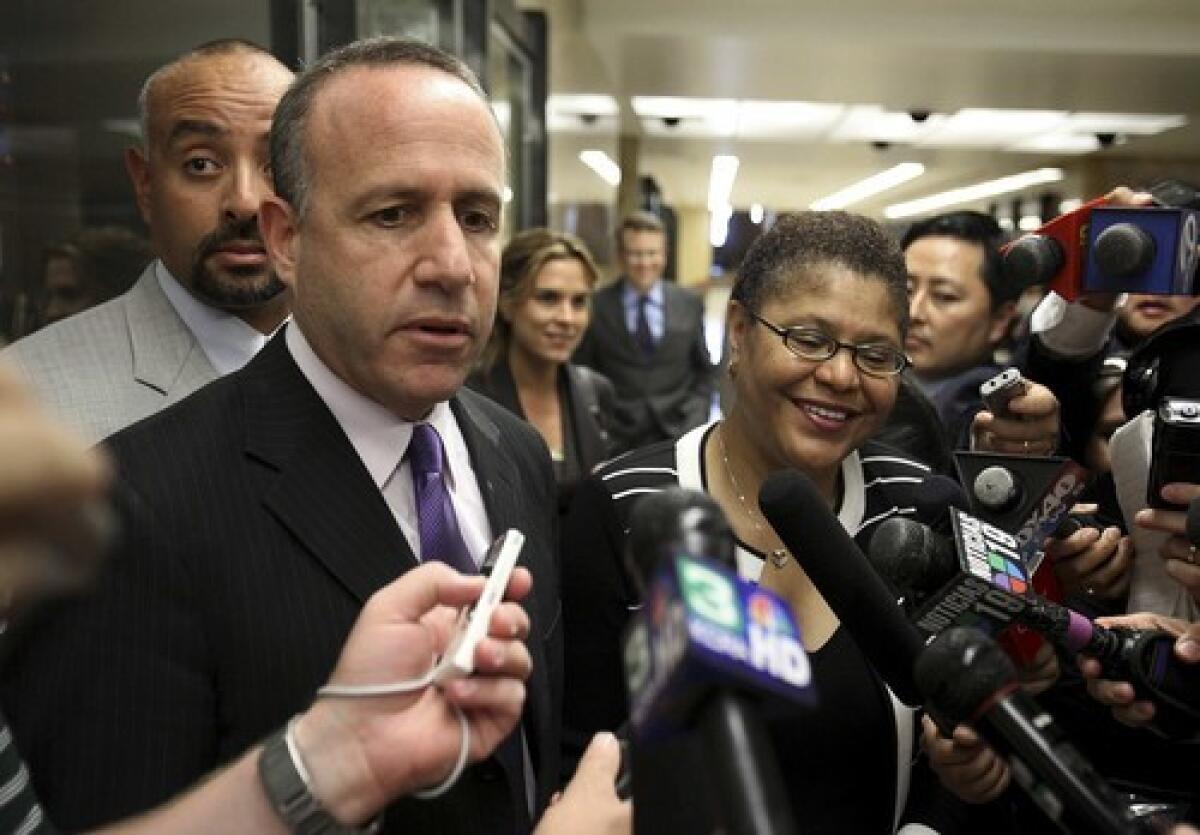In Sacramento, they all dropped the ball

- Share via
From Sacramento — They whiffed a fat batting practice pitch. Blew a gimme putt. Inexplicably clanked a slam-dunk.
Pardon the sports jargon, but it’s a civil way to characterize incompetence and failure in Sacramento. It avoids invective language already too prevalent in California’s Capitol.
Three weeks ago, as I left town on vacation, the politicians seemed poised to close a $24-billion deficit hole, which would have saved the state from issuing costly IOUs and suffering national ridicule.
Whatever budget deal ultimately is passed -- and in this economy it’ll only be a temporary fix, at best -- virtually the same agreement could have been reached weeks ago.
What happened? For one, Gov. Arnold Schwarzenegger swung for the fence -- not willing to settle for a run-scoring single -- and didn’t seem to know where the fence was.
But there were errors all around.
Democrats wasted too much time fumbling with tax increases that they knew never were going to connect and that many voters had made clear they hated.
The loudest message from the California electorate while rejecting the governor and Legislature’s budget propositions in May was that it wanted Sacramento politicians to fix the state’s fiscal mess themselves and not dither. Just do it!
So much for that notion.
But accompanying that overarching message was a strong chorus of: “Stop taxing us. Live within your means.”
Schwarzenegger and Republican legislators heard the “no tax” gospel, even if some public employee unions and liberal activists closed their ears.
Democratic legislative leaders understood the political reality: They had few options. Deeper slashes had to be made in healthcare and welfare programs. Education would take a big hit, although there’d be some help from federal stimulus money. More cuts would be needed in virtually every state program, from prisons to parks.
Moreover, voters had granted Democrats a license to whack away.
The electorate’s verdict had plunged the state $6 billion deeper into debt, cut off $16 billion in future tax hikes and denied schools $9 billion in eventual restoration of previous cuts. Before casting their ballots, voters had been warned about the dire consequences of rejecting the props.
Additionally, the measures had been opposed by labor and social groups that despised the ballot package’s key feature, a modest spending cap. So the Legislature’s majority party owed these traditional allies practically nothing when they began yelping about the program cuts -- and trims to state employees’ pay -- forced, in part, by the propositions’ demise.
Politically, signing off on the inevitable budget butchering should have been a slam-dunk. A gimme putt. A soft pitch.
But philosophically, Democrats couldn’t handle it. They did cut sharply, but also decided to play out the game fighting, by pushing tax increases on oil companies, smokers and motorists. That losing effort took up valuable time right before the July 1 deadline for avoiding IOUs.
Democrats produced a stop-gap plan supported by Assembly Republicans that would have staved off IOUs. They proposed $3.3 billion in cuts to education and other programs that would have kept the cash flowing, at least for a few weeks. It would give them time to negotiate more cuts. Schwarzenegger rejected the idea and persuaded Senate Republicans to follow.
That’s where the governor began bobbling the ball, although his coaches figured he was playing to his fan base, what’s left of it.
Issuing IOUs will cost the state roughly $26 million in interest for July, the state controller’s office estimates. The IOUs also prompted Wall Street bond rating agencies to lower California’s credit to near junk status. That potentially could cost the state $7.5 billion over 30 years, according to the treasurer’s office.
Schwarzenegger, aides say, calculated that Democrats wouldn’t negotiate seriously without facing a deadline, such as the latest: most banks refusing to accept IOUs. Negotiating piecemeal would get nowhere, the governor believed.
But he might have dodged IOUs completely. Guess it doesn’t rankle much that the state he has governed for nearly six years must now pay bills with scrip.
Schwarzenegger rankled Democrats by producing a packet of “reform” demands just before the IOU deadline. Most made sense, but they entered the game late.
“Moving the goal posts,” Assembly Speaker Karen Bass (D-Los Angeles) called it.
She also theorized that the governor was going down his “legacy list” -- striving for achievements he can point to after leaving office in 18 months. That’s fine, Bass says, but more thought and deliberation are needed. “You shouldn’t use the budget process to jam through public policy.”
Senate leader Darrell Steinberg (D-Sacramento) says Schwarzenegger returned to “the Terminator zone” after the May election and resumed bashing legislators, making negotiations more difficult.
Typical rhetoric: “I don’t want to kick that can down the alley anymore. I’ve given them enough chances and now I say, let’s fix the problem. . . . It’s easy for the politicians to keep promising things, but they can’t deliver. They live way, way beyond their means.”
You’d think this guy hadn’t been the head coach and superstar for all these years.
Both sides should have called the game long ago. There’ll be no winners -- just bigger losers the longer it lasts.
More to Read
Sign up for Essential California
The most important California stories and recommendations in your inbox every morning.
You may occasionally receive promotional content from the Los Angeles Times.














